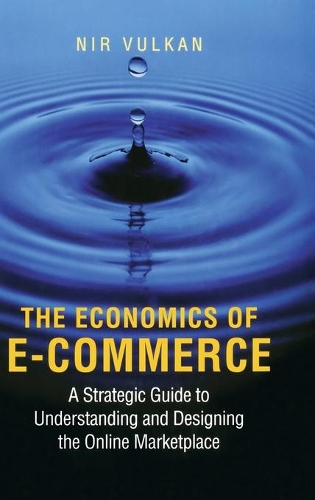
The Economics of E-Commerce: A Strategic Guide to Understanding and Designing the Online Marketplace
(Hardback)
Publishing Details
The Economics of E-Commerce: A Strategic Guide to Understanding and Designing the Online Marketplace
By (Author) Nir Vulkan
Princeton University Press
Princeton University Press
10th June 2003
United States
Classifications
Professional and Scholarly
Non Fiction
Economics
Retail and wholesale industries
Internet guides and online services
380.102854678
Physical Properties
Hardback
240
Width 152mm, Height 235mm
510g
Description
Despite the recent misfortunes of many dotcoms, e-commerce will have major and lasting effects on economic activity. But the rise and fall in the valuations of the first wave of e-commerce companies show that vague promises of distant profits are insufficient. Only business models based on sound economic propositions will survive. This book provides professionals, investors, and MBA students the tools they need to evaluate the wide range of actual and potential e-commerce businesses at the microeconomic level. It demonstrates how these tools can be used to assess a variety of existing applications. Advances in web-based technology--particularly automation and delegation technologies such as smart agents, shopping bots, and bidding elves--support the further growth of e-commerce. In addition to enabling consumers to conduct automated comparisons and sellers to access visitors' background information in real time, such software programs can make decisions for individuals, negotiate with other programs, and participate in online markets.Much of e-commerce's economic value arises from this kind of automation, which not only reduces operating costs but adds value by generating new market interactions. This text teaches how to analyze the added value of such applications, considering consumer behavior, pricing strategies, incentives, and other critical factors. It discusses added value in several e-commerce arenas: online shopping, business-to-business e-commerce, application design, online negotiation (one-to-one trading), online auctions (one-to-many trading), and many-to-many electronic exchanges. Combining insights from several years of microeconomic research as well as from game theory and computer science, it stresses the importance of economic engineering in application design as well as the need for business models to take into account the "total game." As the only serious treatment of the microeconomics of e-commerce, this book should be read by anyone seeking e-commerce solutions or planning to work in the field.
Reviews
"A highly original study that will complement other works on the market."--Library Journal "The Economics of E-Commerce is really a textbook for postgraduate economics. But in its sophistication, it's a valuable analysis of how e-commerce works in economic terms. Corporate e-traders can learn much from it. Well-written, it is accessible to anyone with a couple of years of economics under his or her belt."--The Toronto Globe and Mail "The book represents the outcome of successful interdisciplinary research and an integrating tool in which computer science and economic theory are uniquely combined for business practice and academic research... [It] interprets in an original and effective way current issues sometimes even neglected by economists [and] ... represents a remarkable advance in the economic analysis of e-commerce."--Marcella Scrimitore, The Economist
Author Bio
Nir Vulkan is University Lecturer in Management at the Said Business School and a Fellow of Worcester College, University of Oxford.
